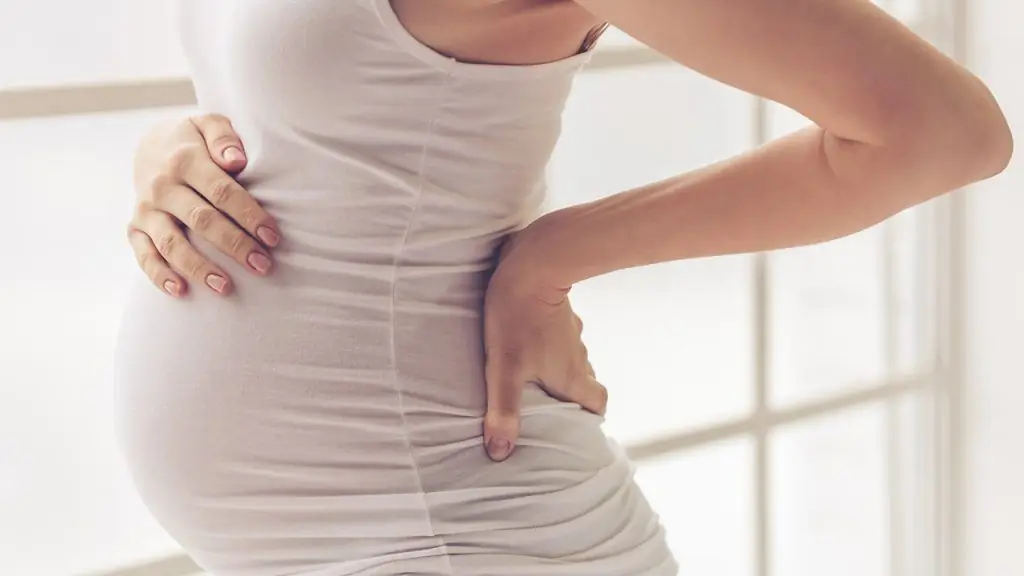2026 Author: Priscilla Miln | miln@babymagazinclub.com. Last modified: 2025-01-22 17:55:24
A large number of expectant mothers, having felt that the child hiccups in the stomach, first experience joyful emotions, and then begin to fear for the he alth of their baby. Hiccups, according to many experts, in most cases is a natural process, indicating that the child's nervous system is fully formed and its development is proceeding at the proper level. Is it normal for a baby to hiccup in the stomach? We will try to answer this question of interest to many people in this article.
Natural Causes of Hiccups
What causes intrauterine hiccups? The answer to this question is of great interest not only to expectant mothers, but also to doctors, because so far they have not come to an unambiguous opinion, due to what circumstances this phenomenon occurs.
There are a number of versions explaining why the baby hiccups in the mother's stomach. They reveal the causes of hiccups that do not pose a threat to the he alth of the mother and her unborn child.
- Developing in the womb, the baby trains its lungs with the help of hiccups. Scientists claim that it reduces pressure on the enlarged respiratory organs and thereby calmsbaby. In the third trimester of pregnancy, at 35-36 weeks, the baby hiccups in the stomach, making involuntary sucking movements. This is because when the baby moves, he may touch his mouth with his feet, hands or umbilical cord.
- A baby sometimes swallows amniotic fluid, which in certain cases enters the organs that provide it with breathing. As a result, the diaphragm contracts and the baby begins to hiccup. This natural process cannot adversely affect the development of the fetus. When a baby is born, his body reacts in the same way to excess food.
- According to another version, a certain location of a woman's body can serve as an impetus for the appearance of intrauterine hiccups. It is most relevant in that time period when the baby is already getting cramped in the mother's tummy. A child can begin to hiccup in the stomach if the mother: while in a sitting position, leans forward sharply, wears tight-fitting underwear and things, during sleep squeezes her stomach with her weight.
- The immaturity of the baby's nervous system can also cause hiccups. Rapid movement, loud noise, the excited state of a pregnant woman can sometimes lead to failures in sending nerve impulses and spasms that accompany malfunctions of the nervous system.
A cause that can cause real harm
In certain cases, regular fetal hiccups may be the result of hypoxia. If there is concern that the baby in the stomach hiccups due to a lack of oxygen, which may adversely affect its development, you should immediately seek medical help.medical assistance.

This serious problem may be indicated by the following symptoms:
- Daily bouts of hiccups do not stop for a long time.
- Hiccups, the baby is active, or vice versa, very slowly, begins to move in the mother's stomach.
- The female representative notices that the tummy has become smaller in volume, its shape has changed.
- A pregnant woman stops getting better and starts to lose weight.
Timely qualified assistance allows you to eliminate hypoxia and completely get rid of its manifestations.
Feelings of a woman
A large number of people are interested in: "When a child hiccups in the stomach, how does a woman feel?" Many future mothers, usually starting from the 26th week, feel tremors in the stomach, repeating at regular intervals. Women who already have experience of motherhood note that the manifestations of hiccups are similar to normal fetal movements, only they are softer and measured.
Some pregnant women, feeling that the baby hiccups in the stomach (the reasons for this process usually do not threaten the full development of the baby), feel minor spasms and twitches inside the abdomen. There are times when the fair sex does not feel absolutely no symptoms of this phenomenon. Usually, intrauterine hiccups, which are called a funny and unique phenomenon, are not capable of hurting expectant mothers.

How to deal with hiccups
"When a childhiccups in the stomach, what to do?" - the female representatives are interested. The hiccups of a baby and an adult are very similar, so you can deal with it in the following ways.
- The most important thing is that the expectant mother needs to calm down and not panic.
- A woman should take a few deep breaths, drink water in small sips, or eat something sour and s alty. But to put into practice the swing of the press and a sharp fright is not recommended, these measures can make the hiccups even stronger or even negatively affect the fetus.
- If the baby hiccups in the stomach, you can go for a walk in a quiet place. Clean air, acting soothingly, will help you put your thoughts in order and forget about problems.
- When it's cool at home, a pregnant woman can use a cozy blanket to warm up. You need to stroke your tummy, chat with the baby, maybe he will stop hiccuping.

What to do if the baby's hiccups interfere with the expectant mother
A large number of women who have already carried and given birth to children, based on their own experience, advise expectant mothers who are hindered by intrauterine hiccups of the baby to do the following:
- If you are lying or sitting, feeling intrauterine hiccups, you should change the position of the body.
- Getting rid of hiccups can help with minimal physical activity, which includes certain exercises.
- It is recommended to stand on your elbows and knees, fix the body in this state for severalminutes and then repeat the exercise again.
- You need to eat less sweets (especially in the evening). The sweet taste of amniotic fluid is especially "attractive" to the baby.

How to prevent frequent hiccups
Why the baby hiccups in the stomach all the time, some mothers are worried. To dispel their fears and concerns, they should visit a doctor and undergo the necessary examinations, which include certain diagnostic methods.

- Doctor's consultation. The specialist will visually examine the expectant mother, ask her questions to find out the true cause of hiccups.
- Fetal cardiotocography. This study allows you to find out the heart rate of the baby. A rapid heartbeat sometimes accompanies hypoxia.
- Ultrasound examination with Doppler. Using this research method, the state of blood flow is assessed and malfunctions in the functions of the placenta are detected. Reduced blood circulation may be one of the symptoms of fetal hypoxia.
Useful tips for expectant mothers
Pregnant women should consider the following guidelines to relieve discomfort from frequent fetal tremors.
- If you want to sleep well, you should fall asleep on your left side.
- You need to include he althy food in your diet, drink water and freshly squeezed juices.
- Physical activity is very beneficial for the body during pregnancy. With herwith help you can recharge your batteries and get rid of stress.
- Expectant mothers are encouraged to go to bed at a certain time. This makes them feel good.

Summary of conclusions
The development of the baby throughout all trimesters of pregnancy directly depends on the state of he alth of the woman, on her nutrition, on compliance with the recommendations of the gynecologist. If, starting from the very beginning of pregnancy, in the analyzes of the expectant mother, all indicators are normal, she eats properly and receives all the necessary vitamins, then the development of the fetus is usually not in danger.

If a child hiccups in the mother's stomach, as experts say, he does not feel pain and discomfort. Usually, hiccups are not an alarm and do not threaten the development of the fetus. In most cases, it can be considered as an individual trait of an individual child. After all, some of the babies, while in the womb, actively push their legs into the stomach, some of them "want strawberries in the middle of winter," while others simply hiccup. But only an examination and consultation with a specialist will help determine exactly whether the development of the child is normal.
Recommended:
Advice to expectant mothers: is it possible to retract the stomach during pregnancy?

Many expectant mothers, especially from the ranks of athletes, often wonder if it is possible to draw in the stomach during pregnancy. Some have to tighten their abdominal muscles during exercise, others do it out of habit - to look more slender and fit. Is there any danger to the baby in this, or vice versa - is such an exercise useful and will help a woman to bear a he althy baby and give birth without problems and special efforts?
Pregnancy by weeks and months. What and how changes in the body of the expectant mother:

It is generally accepted to determine the gestational age by weeks and months. That is, 40 weeks or 9 months. Consider in the article how the gestational age is divided into trimesters and what are the features of the course of pregnancy at its different stages
The child spits up after each feeding and hiccups: causes, doctor's advice

Regurgitation is the ejection of milk or food eaten into the child's mouth from the stomach, after which hiccups may begin. Although this is normal, it is a concern for many parents, especially if such a release occurs in a fountain
Placenta accreta: symptoms, causes, diagnostic methods, possible risks for mother and child, treatment methods and recommendations from gynecologists

The placenta is an embryonic organ that allows the fetus to receive oxygen and nutrition during pregnancy. In the normal state of the woman and the correct course of pregnancy, the placenta is attached at the top of the uterus and remains there until the very time of childbirth. After the birth of a child, it exfoliates from the wall of the uterus and comes out
Can a newborn sleep on his stomach after feeding? Can a newborn sleep on her mother's stomach?

Can a newborn baby sleep on his stomach? There are different opinions on this subject, which we will try to consider carefully

